|
|
|
Sort Order |
|
|
|
Items / Page
|
|
|
|
|
|
|
| Srl | Item |
| 1 |
ID:
100833
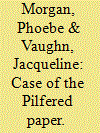

|
|
|
|
|
| Publication |
2010.
|
| Summary/Abstract |
While there is nothing new about academic dishonesty, how it is committed, prevented, and detected has been dramatically transformed by the advent of online technologies. This article briefly describes the concurrent emergence of online writing assistance services and Web-based plagiarism detection tools and examines the implications of both for student-faculty relations, faculty workload, and student learning. Finally, we provide three alternative strategies for deterring, detecting, and documenting all forms of plagiarism.
|
|
|
|
|
|
|
|
|
|
|
|
|
|
|
|
| 2 |
ID:
100789
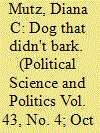

|
|
|
|
|
| Publication |
2010.
|
| Summary/Abstract |
Using the most extensive dataset available on the 2008 election, I examine the impact of dog ownership on presidential vote preference. Canines were elevated to the status of a campaign issue when, during the 2008 campaign, Barack Obama publicly promised his daughters a dog after the election was over, a campaign promise that has since been fulfilled. However, this announcement appears to have unintentionally highlighted the absence of a key point of potential identification between this candidate and voters, and thus to have significantly undermined the likelihood that dog-owning voters would support Obama. I elaborate upon the implications of this finding for future presidential candidates.
|
|
|
|
|
|
|
|
|
|
|
|
|
|
|
|
| 3 |
ID:
100826
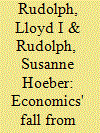

|
|
|
|
|
| Publication |
2010.
|
| Summary/Abstract |
Not long ago, many political scientists suffered from economics envy. Some still do. They view economics as the queen of the social sciences, claiming that it is "scientific," like physics. Physicists and other natural scientists spend most of their time trying to explain phenomena, but non-behavioral micro-economists spend most of their time on mathematical proofs and econometric tests of a priori theories based on intuitive plausibility or principles of "rational action." Being "scientific" it was alleged, meant that economics could access objective knowledge, knowledge that was said to be true independent of time, place, and circumstance. Robert Bates called on political scientists to do the same by arguing that they should be in search of "lawful regularities which … must not be context bound" (Bates 1997b).
|
|
|
|
|
|
|
|
|
|
|
|
|
|
|
|
| 4 |
ID:
100787
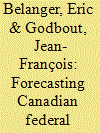

|
|
|
|
|
| Publication |
2010.
|
| Summary/Abstract |
In recent decades, the scientific forecasting of election outcomes has made great strides in a number of advanced industrial democracies. One country that has not received much attention to date is Canada. In this article, we present a vote function model to forecast Canadian federal elections. We explain our model's theoretical underpinnings and assess its statistical properties and forecasting capabilities against all federal elections held between 1953 and 2008. We then explore potential ways for improving the model's accuracy. We conclude by discussing the forecast of different hypothetical scenarios for an upcoming federal election.
|
|
|
|
|
|
|
|
|
|
|
|
|
|
|
|
| 5 |
ID:
100777
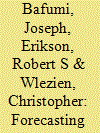

|
|
|
|
|
| Publication |
2010.
|
| Summary/Abstract |
In this article, we present a forecast of the 2010 midterm House election based on information available in early July 2010. We combine this forecast with a note of caution, explaining why electoral circumstances might lead our forecast to err. Finally, we present guidance regarding how to update the electoral forecast for 2010 based on new information that will become available leading up to Election Day.
|
|
|
|
|
|
|
|
|
|
|
|
|
|
|
|
| 6 |
ID:
100780
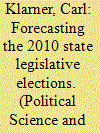

|
|
|
|
|
| Publication |
2010.
|
| Summary/Abstract |
This article offers forecasts made on July 22, 2010, for the 2010 state legislative elections. Most work in the election forecasting field has been done on presidential and U.S. House elections. Less has been done for U.S. Senate elections, and almost none for gubernatorial or state legislative elections. This year will see much attention directed at the 43 state legislatures holding elections, because many will have the responsibility for drawing new district lines based on the 2010 census. Furthermore, of those chambers with elections scheduled in 2010, seven currently contain one party with less than a 5% margin of control. With so much at stake, these will clearly be contests to watch.
|
|
|
|
|
|
|
|
|
|
|
|
|
|
|
|
| 7 |
ID:
100790
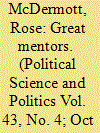

|
|
|
|
|
| Publication |
2010.
|
| Summary/Abstract |
I have been extremely blessed in my life to have benefitted from some amazing mentors and friends in both psychology (most notably, Amos Tversky, Phil Zimbardo, and Leda Cosmides) and political science. Inspired by the occasion of Robert Jervis' festschrift, which importantly does not signal his imminent retirement, I was prompted to take advantage of this opportunity to express my deep and abiding appreciation for his advice and guidance over the years. In keeping with Kristen Monroe's model of three, I also reflect here on the critical roles that two additional mentors, Bruce Bueno de Mesquita and Peter Katzenstein, have had on my career and my life.
|
|
|
|
|
|
|
|
|
|
|
|
|
|
|
|
| 8 |
ID:
100776
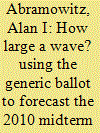

|
|
|
|
|
| Publication |
2010.
|
| Summary/Abstract |
As Election Day approaches, many political commentators are asking whether the 2010 midterm elections could be a reprise of 1994, when Republicans picked up eight seats in the Senate and 52 seats in the House of Representatives to take control of both chambers for the first time in 40 years. There is almost universal agreement that Republicans are poised to make major gains in both the House and the Senate. And while the GOP's chances of gaining the 10 seats needed to take control of the upper chamber appear remote, results from the generic ballot forecasting model indicate that the 39 seats required to take back the House of Representatives are well within reach.
|
|
|
|
|
|
|
|
|
|
|
|
|
|
|
|
| 9 |
ID:
100791
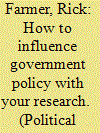

|
|
|
|
|
| Publication |
2010.
|
| Summary/Abstract |
Government policymakers rarely consult with academic experts before formulating policy positions. When policymakers do seek out academics, they are often attempting to justify a position they already hold, not searching for objective analysis. Academics could add much to the policy debate if they were more meaningfully engaged in the discussion.
|
|
|
|
|
|
|
|
|
|
|
|
|
|
|
|
| 10 |
ID:
100792
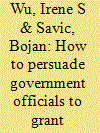

|
|
|
|
|
| Publication |
2010.
|
| Summary/Abstract |
Rick Farmer's article focuses on ways in which academic political scientists can influence policymakers. At the Toronto meeting of the Working Group on Practicing Politics, government political scientists also recognized that academics often are frustrated by the process of getting information from the government and cooperation from officials.
|
|
|
|
|
|
|
|
|
|
|
|
|
|
|
|
| 11 |
ID:
100835
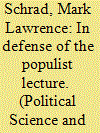

|
|
|
|
|
| Publication |
2010.
|
| Summary/Abstract |
Information and communication technology (ICT) programs like Microsoft PowerPoint and Apple Keynote have become the norm for large university lecture classes, but their record in terms of student engagement and active learning is mixed at best. Here, the author presents the merits of a "populist" lecture style that takes full advantage of the variety of features available from the latest generation of ICT programs. Based on visual variety, audio and visual sound bites, and the incorporation of humor and pop-cultural references, this populist approach not only facilitates greater student attention and engagement with the class materials, but also offers unmatched opportunities for extending student learning beyond the confines of the large lecture hall.
|
|
|
|
|
|
|
|
|
|
|
|
|
|
|
|
| 12 |
ID:
100783
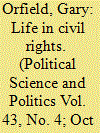

|
|
|
|
|
| Publication |
2010.
|
| Summary/Abstract |
I have lived a life in which I have often been involved in public debates and controversies, but not as a public intellectual whose ideas were embraced by the White House or celebrated by the New York Review of Books. Mine has been a very different kind of experience that could be characterized more as an against-the-grain persistence in digging into some fundamental questions of social inequality that were fashionable a half century ago but were abandoned by most Americans with influence and power. I am convinced that we have no viable policies in place that will produce a healthy and successful society as our vast racial transition continues. My research has convinced me that there are much better answers.
|
|
|
|
|
|
|
|
|
|
|
|
|
|
|
|
| 13 |
ID:
100786
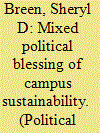

|
|
|
|
|
| Publication |
2010.
|
| Summary/Abstract |
The rise of sustainability rhetoric, curriculum, infrastructure, and marketing on college campuses is a mixed blessing. On the one hand, college presidents are pledging to eliminate their campuses' global warming emissions; colleges and universities are building wind turbines, composters, and green buildings; and sustainability coordinators are the latest surge in new staff hires. However, the greening of college campuses has a less welcome side as well, and examination of the campus sustainability movement suggests an unsettling lack of theoretical and ideological analysis. In this article, I praise what is being done well, identify the political analysis that has been avoided, and provide arguments for what has yet to be addressed. I argue that the trend toward campus sustainability, while praiseworthy in some significant ways, has left some troubling theoretical assumptions largely undisturbed.
|
|
|
|
|
|
|
|
|
|
|
|
|
|
|
|
| 14 |
ID:
100821
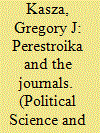

|
|
|
|
|
| Publication |
2010.
|
| Summary/Abstract |
It is fitting to measure Perestroika's impact through the contents of the leading political science association journals. The original Perestroika manifesto railed at the American Political Science Review (APSR), and many subsequent Perestroika protests condemned the skewed contents of the APSR, the American Journal of Political Science (AJPS), and the Journal of Politics. Large national and regional associations publish and pay for these journals. The position of Perestroika has been that their contents should represent the many types of research that political scientists are doing, which was not the case when the movement began.
|
|
|
|
|
|
|
|
|
|
|
|
|
|
|
|
| 15 |
ID:
100822
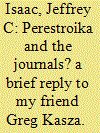

|
|
|
|
|
| Publication |
2010.
|
| Summary/Abstract |
The emergence of the Perestroika movement in U.S. political science was an important moment in the contemporary history of our discipline, and as we approach the 10-year anniversary of this movement, it is fitting that PS should publish a retrospective symposium on its origins and significance.
|
|
|
|
|
|
|
|
|
|
|
|
|
|
|
|
| 16 |
ID:
100824
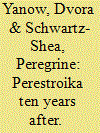

|
|
|
|
|
| Publication |
2010.
|
| Summary/Abstract |
One of the primary concerns driving Perestroika was the hegemony of quantitative methods in American political science research, curricula, journals, and positions, to the exclusion of qualitative and interpretive approaches. In this article, we assess the contemporary methodological diversity of U.S. political science, at the APSA in particular, to see what, if anything, has changed over the last 10 years. This is an admittedly rough assessment, as the deadline for this symposium did not allow time to repeat the research projects that started Perestroika's and our own solo and joint efforts, the latter preceding and then intersecting with the former. We therefore give a broad overview of methods-directed activities, although we cannot help but see events through the lens of our own involvement in them, and that view is perforce partial.
|
|
|
|
|
|
|
|
|
|
|
|
|
|
|
|
| 17 |
ID:
100831


|
|
|
|
|
| Publication |
2010.
|
| Summary/Abstract |
In 10 years, Perestroika has gone from a "raucous" forum discussing a wide range of issues to a largely moribund list that posts occasional jobs and attacks those who dare to bring up controversial topics. A good example of the decline of the list was illustrated by one participant's recent attempt to raise the issue of Glenn Beck's slander of Frances Fox Piven and the late Richard Cloward. The poster was attacked by some group members for "politicizing" Perestroika. These members claimed that the list was a no-politics zone for debating methodological issues. Since Glenn Beck did not hold a tenured position in the discipline, others felt that his ideas were not rational enough to warrant a response. Some on the list (perhaps with scant knowledge of left-wing media) proposed approaching Rachel Maddow, and while a few media outlets did take up this case, it never reached the main talkies. In the end, however, Perestroikans failed to stand up for the integrity of the free and wide-ranging discourse they claim to champion
|
|
|
|
|
|
|
|
|
|
|
|
|
|
|
|
| 18 |
ID:
100785
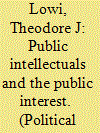

|
|
|
|
|
| Publication |
2010.
|
| Summary/Abstract |
Upon my first reading of the Etzioni autobiography, I recalled my favorite book review, written by a nine-year-old, who also should have won a prize for the youngest author and the shortest review ever: "This book told me more about penguins than I wanted to know.
|
|
|
|
|
|
|
|
|
|
|
|
|
|
|
|
| 19 |
ID:
100793
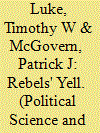

|
|
|
|
|
| Publication |
2010.
|
| Summary/Abstract |
Ten years ago this October, the members of the political science community might have heard a short, but quite fascinating, cri de coeur about the prevailing practices of the discipline in the United States at the turn of the century. Circulating as an e-mail message shortly after the 2000 APSA Annual Meeting, it popped up in the inboxes of a few political scientists and graduate students throughout the academy, who then quickly redirected its message to hundreds and then thousands of their colleagues. Signed "Mr. Perestroika," the e-mail's short passages bemoaned the profession of political science as it was unfolding under the allegedly misguided aegis of an "Orwellian system" of methodological formalism. Portraying the discipline as trapped in this intellectual cul de sac, Mr. Perestroika depicted an essentially degraded social science discipline that favored the political views of a "coterie" of "East Coast Brahmins" by ratifying their narrow methodological practices (cited in Monroe 2005, 9-11). Such practices, based mostly on "statistics or game theory," wrongly promoted a simplistic and, for far too many students of the state and society, discredited economic understanding of politics. This unenviable methodological parochialism in turn favored a style of "professional correctness" that froze out other political perspectives and analytical approaches (Luke 1999, 345-63) in the discipline's key journals, major organizations, and scholarly practices. For Mr. Perestroika, these distorted academic norms were also compromising the relevance, utility, and validity of political science as an applied social science.
|
|
|
|
|
|
|
|
|
|
|
|
|
|
|
|
| 20 |
ID:
100838
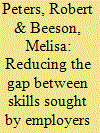

|
|
|
|
|
| Publication |
2010.
|
| Summary/Abstract |
The process of transforming students from novices into experts relies on active learning and the development of an appreciation for the links among topics. Since rote or stimulus-response learning is preferred by a majority of students who are beginning their programs of study but does not optimize learning and understanding, the first step in the process is changing students' preference to active learning. As students progress from 100- to 400-level courses, this outcome can be accomplished by reducing the amount of class time that instructors dedicate to lectures that introduce new material and increasing the amount of time dedicated to active learning strategies. Because of PowerPoint's linear structure, teachers can foster learning by supplementing traditional slides with tables, charts, graphs, and concept maps that explicate the links among topics. Concept maps also lend themselves to assessing students' mastery of concepts and the value added by class discussions. Both measures enable instructors to enhance their teaching effectiveness and, over time, use class sessions more efficiently.
|
|
|
|
|
|
|
|
|
|
|
|
|
|
|
|
|
|
|
|
|